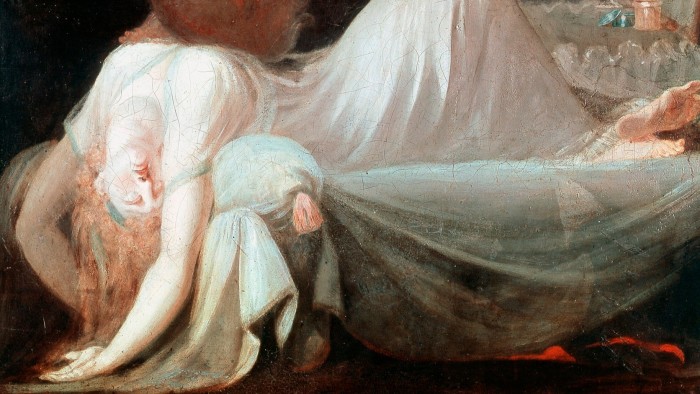Unlock the Editor’s Digest for free
Roula Khalaf, Editor of the FT, selects her favourite stories in this weekly newsletter.
Dreams are a strange phenomenon: often a conversational bore in real life, when transformed into fiction they become the bedrock for some of our most engaging literature. From Lewis Carroll’s Wonderland fantasies to the horrors of Stephen King, authors have a long and colourful history of depicting and converting dreams, creating a window into our psyches and our times.
Three recently published books — non-fiction, fiction and poetry — trace the connection between these narratives of the unconscious, and the waking fears and disruptions that feed them.
Charlotte Beradt’s The Third Reich of Dreams: The Nightmares of a Nation, to be republished this month by Princeton University Press, asks what happens when reality infects and changes the dreams of ordinary people. Beradt’s investigation was first published in 1960s, in German and then in English. Damion Searls’ new translation revives this almost forgotten but hugely insightful text.
Four weeks after Adolf Hitler came to power in 1933, Berlin-based Beradt lost her job as a journalist, joining the many intellectuals who were purged, jailed or otherwise swept out of the way as the Nazis took over Germany. Beradt and her husband were briefly imprisoned. Even after their release, jobless and at risk, Beradt’s fears pursued her into dreams — and she was inspired to start documenting the dreams of others.
By 1939, when she and her husband fled to the US, finding shelter with Hannah Arendt and other exiles, Beradt had collected about 300 dreams, having scoured Berlin for people who were willing to share the anxieties that followed them beyond sleep. “The things that filled my dreams must fill theirs, too,” she recalled in a 1943 article for Free World magazine, “breathless flight across fields, hiding at the top of towers of dizzying height, cowering down below in graves, everywhere the Storm Troopers at my heels”.
As Beradt observed: “The rarity of dreams of revenge is notable.” And yet, her creativity and courage in recording these dreams was its own act of resistance. She concealed her notes in the spines of books, replacing the word “Party” with “family”, “arrest” with “flu”, and dubbing Hitler, Goebbels and Goring “Uncle Hans, Uncle Gustav and Uncle Gerhard”.
If dreams were the last private space available to humans, even in the most tyrannical dictatorships, is that still true when algorithms and social media streams intrude into every aspect of our lives? In Laila Lalami’s sixth book, The Dream Hotel, AI companies have taken over sleep, monitoring dreams through the Dreamsaver, a skull implant that delivers restful nights, but also reports disturbing dreams to the government.
“Dreams are really our last islands of freedom,” Lalami said in a recent interview. “The amount of data that the Big Five [tech companies] collect has become more expansive and more granular, threatening our freedoms, our mental health, and even our free will.” The Dream Hotel follows the protagonist, Sara, into detention centres, thought-crimes and the terrifying consequences of being caught on the wrong side of an algorithm, while Lalami makes an eloquent case for living free of surveillance, waking or sleeping: “She wants to be free, and what is freedom if not the wresting of the self from the gaze of others, including her own?”
Perhaps these two books mirror the anxieties of this uncertain age. At a time when many are tempted to interpret dreams, holding up a scrying glass to the unconscious in search of Jungian reassurance, both authors bring real insight to what dreams tell — or don’t. But it takes a poet to illuminate what dreams can lead us towards. Matthew Zapruder’s I Love Hearing Your Dreams: Poems (2024) is for all sleepers who are “already awake/ at that oddest hour/ that does not end,/ the crooked, unnumbered one”.
In the collection, Zapruder, who teaches creative writing at Saint Mary’s College of California, counters the pop-psych tendency to “interpret” dreams: “poems your dreams/ have no hidden/ agenda to be wise/ they are made/ to be forgotten/ so something/ can be known”. He writes, he told an interviewer, early in the morning, “when everything seems full of promise, anxiety, beauty, silence and danger”.
For Beradt, dreams told the truths that humans hid from their waking selves; for Lalami, dreams can be precious, if fragile, sanctuaries. And for readers, both the vast literature of dreams and Zapruder’s journey through these nightscapes are a reminder to spend some time in solitude, to tap into our deepest instincts rather than be swept away by the rushing clamour of the world.
Join our online book group on Facebook at FT Books Café and follow FT Weekend on Instagram and X
